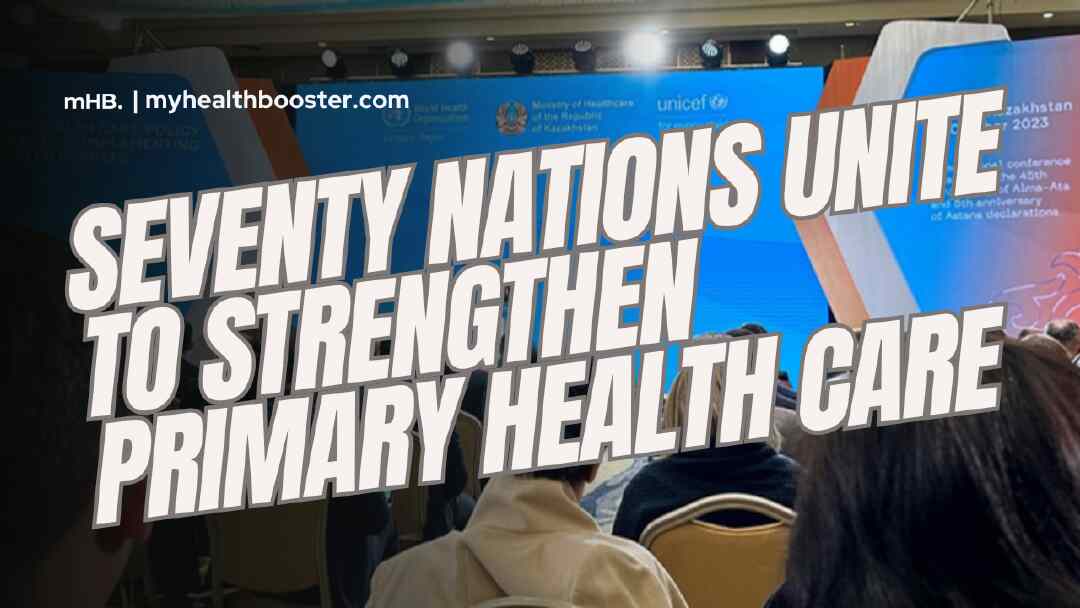Just one month following the resolute global commitment to intensify efforts towards achieving universal health coverage (UHC) at the United Nations General Assembly, a gathering of 70 countries convened to elevate investments in primary health care (PHC) by 2030.
The “Primary Health Care Policy and Practice: Implementing for Better Results” International Conference was a significant event marking the 45th anniversary of the Alma-Ata Declaration and the 5th anniversary of the Astana Declaration, both pivotal proclamations on primary health care. This assembly, which drew over 600 health policy-makers and partners from across the globe, unfolded in Kazakhstan—the very place where these historic PHC declarations originated. The conference was co-hosted by the Government of Kazakhstan, the World Health Organization (WHO), and UNICEF.
It is disconcerting that over half of the world’s population still lacks access to essential health services, while a staggering two billion people confront severe financial hardships due to healthcare costs. Participants passionately called for amplified investments in PHC, capitalizing on digital innovations, ensuring safeguards against catastrophic out-of-pocket health expenses, and making substantial investments in the health and care workforce to address the impending shortage of 10 million health workers projected by 2030.
Dr. Tedros Adhanom Ghebreyesus, WHO Director-General, underscored the urgent need for equity, especially as the most vulnerable and marginalized populations bore the heaviest burdens during the pandemic. Dr. Tedros emphasized WHO’s dedication to collaborate with governments, international financial institutions, partners, youth, and civil society to radically change the trajectory, highlighting the criticality of prioritizing action and investments in a primary health care approach.
The gravity of the situation demands an additional investment of at least US$ 200–328 billion annually, roughly equivalent to 3.3% of national gross domestic product, to extend the PHC approach globally across low- and middle-income countries, in line with commitments made in the second United Nations Political Declaration on UHC adopted on October 5, 2023.
PHC, with its core objective of delivering good quality, more affordable, and equitable access to essential health services, represents the most inclusive, effective, and efficient pathway to UHC. Achieving PHC mandates a bolstered collaborative effort to enhance political commitment, governance, financing, and public involvement. Furthermore, it requires a fundamental shift, moving from health systems that predominantly address diseases to establishing systems that comprehensively address the overall health and well-being of individuals, with the aim of fostering healthier communities that are better shielded against diseases.
Amplifying PHC implementation on a global scale could have the potential to save more than 60 million lives and contribute to 75% of the projected health advancements set out in the Sustainable Development Goals.
WHO’s Commitment to Primary Health Care
WHO, through its Special Programme on Primary Health Care (SP-PHC), is devoted to facilitating the profound transformation of health systems towards PHC-centered approaches. WHO also ensures the provision of robust normative guidance to monitor progress, ensure accountability, and maximize impact. The WHO SP-PHC is home to the UHC Partnership, which is WHO’s most extensive platform for international cooperation on UHC. A pre-conference workshop was conducted in Astana by the UHC Partnership for over 250 delegates representing ministries of health, development partners, and WHO country offices worldwide. The workshop served as an opportunity for countries to explore the linkages between PHC and UHC, the intricate political dynamics surrounding health system reforms, and the key success factors enabling innovation and investment in primary health care for more effective implementation in the near future.
In alignment with the Global Action Plan for Healthy Lives and Well-being (SDG3 GAP), WHO, UNICEF, and their partners are working collaboratively and creating synergies across various sectors to better assist countries in fulfilling their UHC commitments through primary health care. WHO and UNICEF have long been steadfast partners in the realm of primary health care. Together, they have crafted the Operational Framework for PHC, which serves as a clear and comprehensive guide for any country globally to take action.
